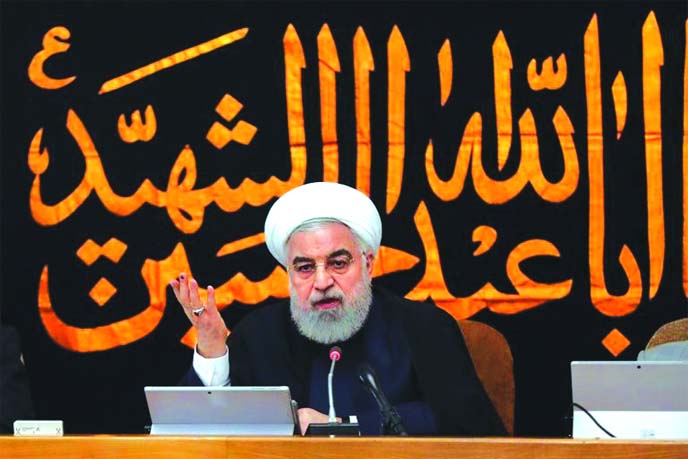
AP, Tehran :
Iran’s president urged the U.S. on Wednesday to “put warmongers aside” as tensions roil the Persian Gulf amid an escalating crisis between Washington and Tehran in the wake of the collapsing nuclear deal with world powers.
Hassan Rouhani’s remarks signaled approval of President Donald Trump’s abrupt dismissal of John Bolton as national security adviser, a man routinely pilloried by Iranian Foreign Minister Mohammad Javad Zarif as part of a “B Team” that targeted Iran.
Bolton had for years been critical of Tehran and once promised before an Iranian exile group that they’d be celebrating the overthrow of Iran’s government this year.
Bolton’s departure also comes amid speculation about Trump potentially meeting Rouhani during the upcoming U.N. General Assembly this month in New York. Whether such a meeting materializes, however, remains in question, though Iranian comments Wednesday seemed to suggest Tehran would be willing to pin hostilities on the departing Bolton rather than Trump himself.
Rouhani spoke after a Cabinet meeting Wednesday, a day that saw all major newspapers in Iran cover Bolton’s departure. The pro-reform Shargh daily newspaper had one large headline that read: “Bolton: A scapegoat for Iran?”
“Americans have to realize that warmongering and warmongers are not to their benefit,” the Iranian president said in televised remarks. “They should not only abandon warmongering but also abandon their maximum pressure policy.”
Ali Rabiei, a government spokesman, said after the meeting that Bolton’s dismissal may help the U.S. have a “less biased” attitude toward Iran.
Though he stressed the dismissal was an internal U.S. issue, Rabiei called Bolton “the symbol of America’s hawkish policies and its animosity toward Iran.”
For his part, Zarif again used Twitter to write about what he calls the #B_Team, which included Bolton, Israeli Prime Minister Benjamin Netanyahu, Saudi Crown Prince Mohammed bin Salman and Abu Dhabi Crown Prince Mohammed bin Zayed Al Nahyan, all hawks on Iran.
Zarif said “the world – minus 3 or 2 panicked cohorts – was breathing a sigh of relief” after Bolton’s ouster. “Thirst for war – maximum pressure – should go with the warmonger-in-chief,” Zarif wrote.
Hard-liners, however, urged caution.
Gen. Mohsen Rezaee, a commander in the powerful Revolutionary Guard and its former chief, said in a tweet: “We will not be deceived by the sacrificing of Bolton.”
Bolton was critical of any potential talks between Trump and leaders of Iran and had persuaded Trump to keep U.S. forces in Syria to counter the Iranian influence in the region.
Iran’s president urged the U.S. on Wednesday to “put warmongers aside” as tensions roil the Persian Gulf amid an escalating crisis between Washington and Tehran in the wake of the collapsing nuclear deal with world powers.
Hassan Rouhani’s remarks signaled approval of President Donald Trump’s abrupt dismissal of John Bolton as national security adviser, a man routinely pilloried by Iranian Foreign Minister Mohammad Javad Zarif as part of a “B Team” that targeted Iran.
Bolton had for years been critical of Tehran and once promised before an Iranian exile group that they’d be celebrating the overthrow of Iran’s government this year.
Bolton’s departure also comes amid speculation about Trump potentially meeting Rouhani during the upcoming U.N. General Assembly this month in New York. Whether such a meeting materializes, however, remains in question, though Iranian comments Wednesday seemed to suggest Tehran would be willing to pin hostilities on the departing Bolton rather than Trump himself.
Rouhani spoke after a Cabinet meeting Wednesday, a day that saw all major newspapers in Iran cover Bolton’s departure. The pro-reform Shargh daily newspaper had one large headline that read: “Bolton: A scapegoat for Iran?”
“Americans have to realize that warmongering and warmongers are not to their benefit,” the Iranian president said in televised remarks. “They should not only abandon warmongering but also abandon their maximum pressure policy.”
Ali Rabiei, a government spokesman, said after the meeting that Bolton’s dismissal may help the U.S. have a “less biased” attitude toward Iran.
Though he stressed the dismissal was an internal U.S. issue, Rabiei called Bolton “the symbol of America’s hawkish policies and its animosity toward Iran.”
For his part, Zarif again used Twitter to write about what he calls the #B_Team, which included Bolton, Israeli Prime Minister Benjamin Netanyahu, Saudi Crown Prince Mohammed bin Salman and Abu Dhabi Crown Prince Mohammed bin Zayed Al Nahyan, all hawks on Iran.
Zarif said “the world – minus 3 or 2 panicked cohorts – was breathing a sigh of relief” after Bolton’s ouster. “Thirst for war – maximum pressure – should go with the warmonger-in-chief,” Zarif wrote.
Hard-liners, however, urged caution.
Gen. Mohsen Rezaee, a commander in the powerful Revolutionary Guard and its former chief, said in a tweet: “We will not be deceived by the sacrificing of Bolton.”
Bolton was critical of any potential talks between Trump and leaders of Iran and had persuaded Trump to keep U.S. forces in Syria to counter the Iranian influence in the region.

